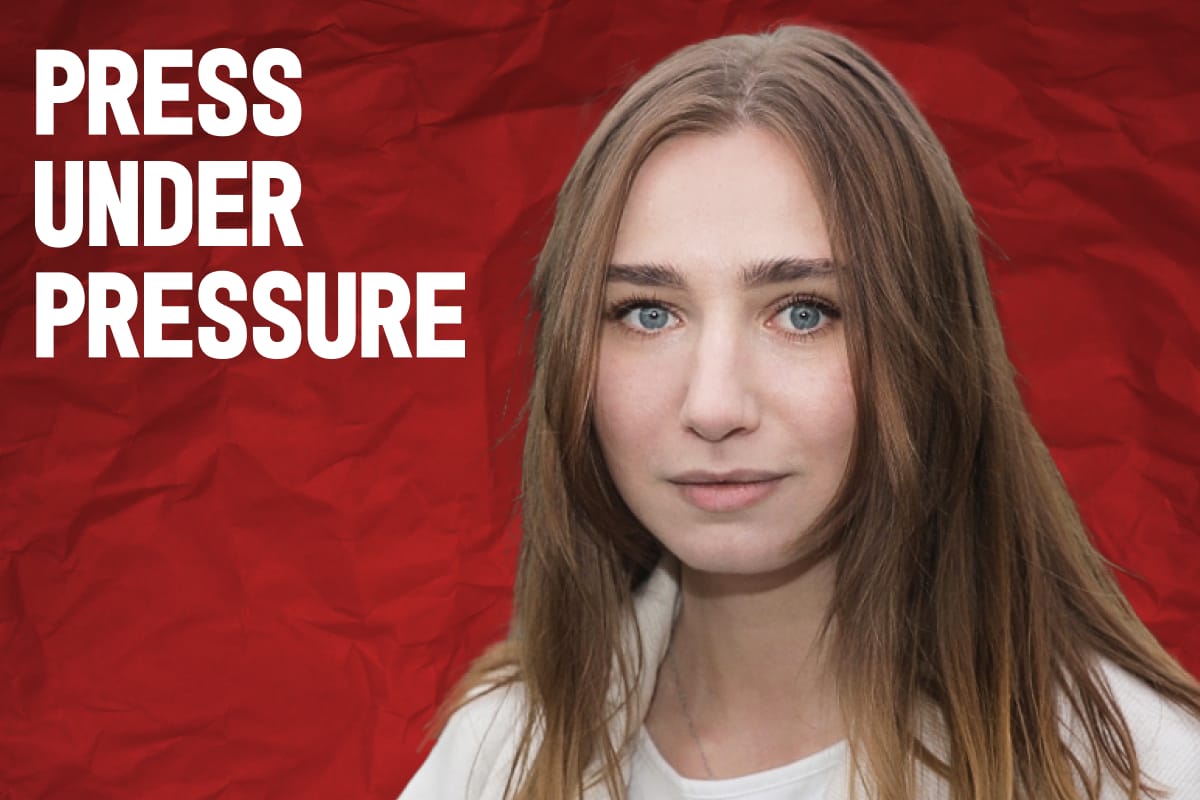
Darya Chultsova covered the protests in Belarus for Belsat TV. On 15 November 2020, together with Katsiaryna Andreyeva, she hosted a live stream of the protest action in memory of Raman Bandarenka, an activist who died from injuries inflicted by law enforcement officers. The journalists were arrested in the apartment they were broadcasting from and a criminal case was opened against them. Prosecutor Alina Kasyanchyk claimed that the journalists had “organised” the protest by broadcasting and commenting on it. Judge Natallia Buhuk sentenced Darya to two years in prison.
For the Press Under Pressure project, the journalist talked about how she underestimated the risks of the job, the support she received in pre-trial detention, the harassment during her first weeks in prison, how she returned to journalism and what she plans to do next.
That everything does not end with a short detention did not occur to me very quickly. There was hope. We (Katsiaryna and I) were held in the temporary detention facility until we were transferred to the police station. There, we were informed that a criminal case had been opened against us. We doubted that till the last. Even when they started taking us to court, we believed that there would be no prison sentence. Maybe a restriction of liberty or some milder punishment, but no real imprisonment! There was hope that they would not go as far.
When I was covering the protests, I never thought I would end up in prison for so long.
I had a few arrests before 2020. Like all Belsat TV reporters, I was held administratively liable. In 2020 I was arrested first in Mahilou, then in Minsk, but each time they would just let me go. I knew I could end up in administrative detention, but I didn’t think they’d plumb a new low.
When I was being transferred from the Minsk temporary detention centre to the Zhodzina remand prison, I naturally wondered what it would all look like. Zhodzina is a prison. As I was escorted through the catacombs – and they are very long, narrow and deep – it felt like we were walking for a very long time, as if we’d never reach the end. This was the first impression – uncomfortable and scary.
It looks frightening. I had the impression that they were going to put me up against a wall and shoot me.
Then I was brought back up to the surface, and I saw these awful metal doors in the corridors – it was pretty distressing. When I walked into my cell, I saw smoke and women in gowns and jumpsuits. A thick cloud of smoke covered the whole space.
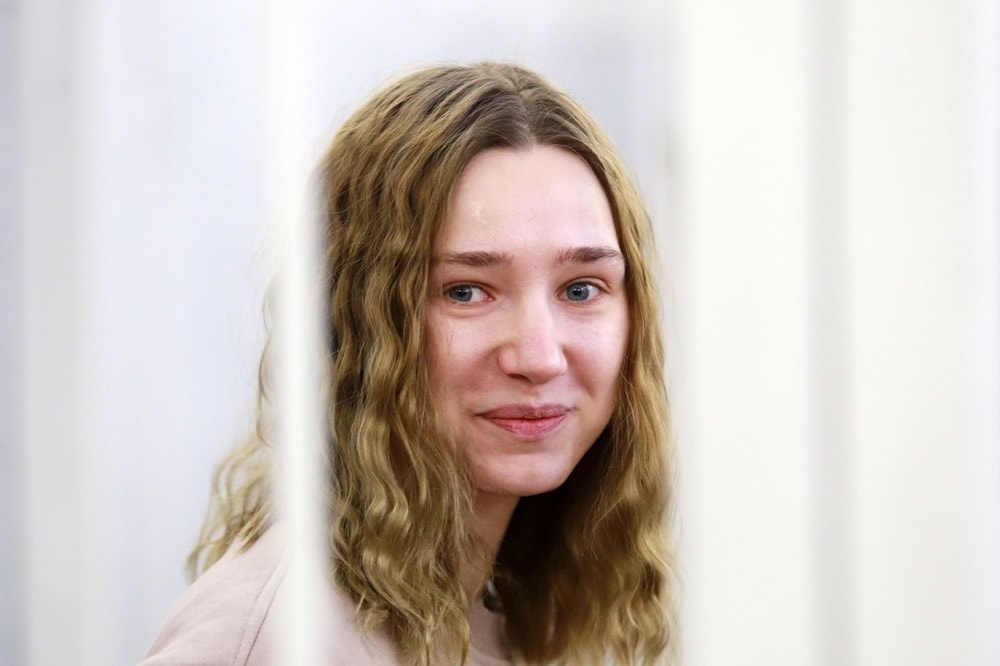
Darya on trial. Photo: AFP
I met some really great people there. In my first cell in the remand prison, I met Volha Klaskouskaya. She got it straight away that I was a political prisoner and started giving me the lowdown on how to live there and how to do things right. That soothed me a lot.
It’s tough for me to put into words what I was going through at the time. I don’t remember what I felt. It seems that Volha noticed that I needed some comforting to help me recover.
Every time I changed the cell, I met great people who were really supportive and open to talking. I didn’t feel alone.
The first two weeks in the penitentiary were pretty rough. I was in a quarantine block and the only political prisoner in our room. At that time, I was one of five or six political prisoners in the whole facility.
In the quarantine cell block, you are always in a closed room. It was trickier there than in the remand centre. In the remand cell, you’ve already got a routine, but there you just sat and waited for something to happen.
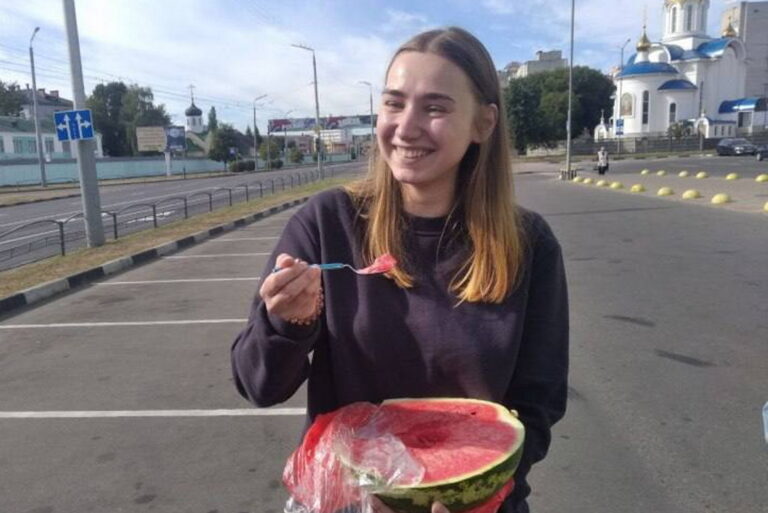
Darya immediately after the release. Photo: Novy Chas
While I was in quarantine block, the operations officers and other prison staff would come to chat with me daily. It was tough for me at the time – a new cell, new people (more than 10 people were crammed into one room), and those conversations with men in uniform. They asked what I was going to do, whether I was going to work, how I was going to behave. They wanted me to understand where I was.
They said that I had no rights and tried to make sure I accepted that. They kept saying that I was guilty of the actions I was convicted of.
I told them straight up that I hadn’t done anything illegal and that I was innocent. They wanted me to write a confession and a mercy petition.
We had to walk through a kilometre-long alleyway inside the prison when we first arrived. I saw a warm, sunny, blue sky, pine trees, grass… I was walking and gazing at everything. The walk took us about 10 minutes until I reached the quarantine cell block. It was brighter there than in the remand centre – there were no bars on the windows, you could see the outside, but you were still locked up.
Ten minutes of walking, and you’re indoors again, you’re being frisked again, you’re naked again.
Then they take you to what’s supposed to be a cell: 12 inmates, nothing to do. You can’t even sit on the bunk, just on a stool. You can’t access your books.
But they gave us sheets of paper and pens. Someone shared a life hack: you let your hand guide the pen and do a sketch and then you cover up the sharp angles. It was an outlet for a lot of emotions. I drew and talked to people.
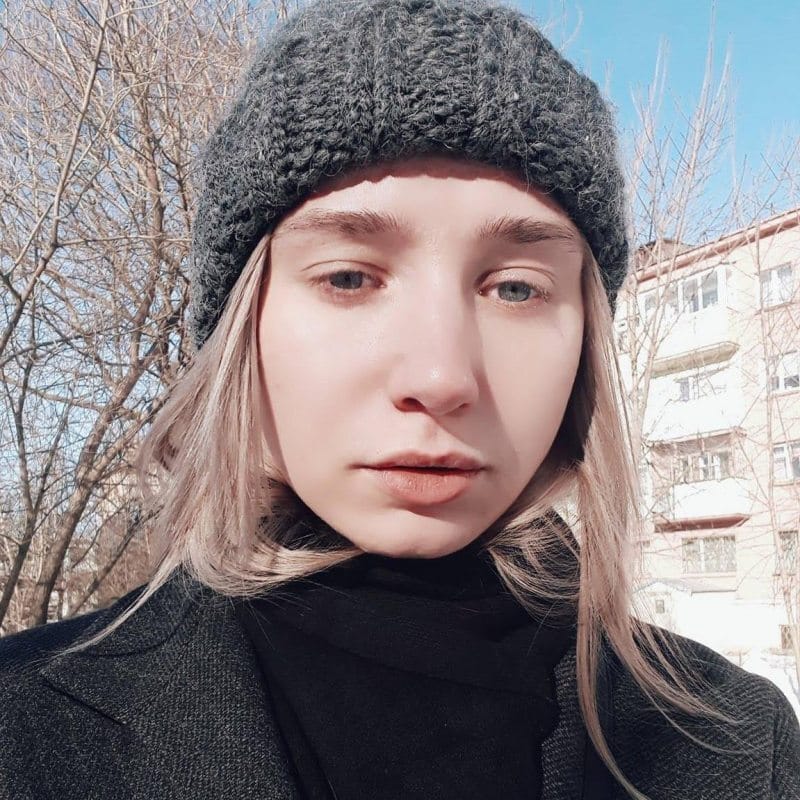
I also had to memorise the routine. After a few days, we were invited to a commission meeting where we reported on the rules we had learned: what we could and couldn’t do, what our rights were [laughs]. And, of course, we talked in more detail about our duties. Then they brought us two books each. The books there were very bad, by the way, but I remember being lucky enough to read Jack London.
There was some ridicule on the part of the prison administration, they could ask things like: “So, did you do any work today?”
The cellmates did not treat me badly. The other thing is that some people were put in the same cell as me for a special reason. As for one person, I understood that she was a “stool pigeon”, and my cellmates warned me about the others. Some of them were already known informers. When they were brought in, we knew we shouldn’t talk to them. I have said nothing to anyone that could discredit me. But it was normal practice to warn each other about “spies”.
The first letters I received from my mother were affectionate: “You are our little and delicate girl, how do you survive there?” Then she went on to say, “I told you you shouldn’t have done it, I had a feeling it would end like this!” I don’t know what was going on for her at that moment and I don’t want to ever know. I know it was hard for her. She then filled me in on what was going on with my family, and I didn’t want to know how tough it was for my mum.
I get why she wrote all that to me, but her words were tough to read.
I responded, “I understand everything, I am your daughter, you’re worried, it must be hard and painful for you. I’m your daughter, but I’m not you, not your hand or foot. I’m an independent person and I make my own decisions and take responsibility for them”.
After a while, she seemed to realise that no matter what, I would not have done anything differently. I was really fortunate that my mother eventually came around and accepted me for who I am, and now I don’t feel pressured by her.
I had no intention of leaving the profession. About two months before I was released, I spoke to Maria Kalenik [another political prisoner] and told her that I wasn’t sure if I should do this job.
I now realise that it was a pretty intense situation. It wasn’t just depression, it was more like a state of stressful anticipation of the release. It was a moment of weakness.
I never really considered leaving the profession. I didn’t want this sentence to have a serious impact on anything.
I like to say that it was just a forced leave, and now I am back to work.
I was released in September and returned to work in December. When I first started out, I was just doing the usual journalistic stuff, like all the other journalists in the office. Sometimes I would go out for a bit of shooting, but I was mostly in the office. The issue we’re facing is that we cover events in Belarus, Ukraine, and Russia, but we can only travel to Ukraine. It’s not possible to work in Belarus, and in Russia, the media I work for was labelled as a foreign agent, so we can’t go there ourselves.
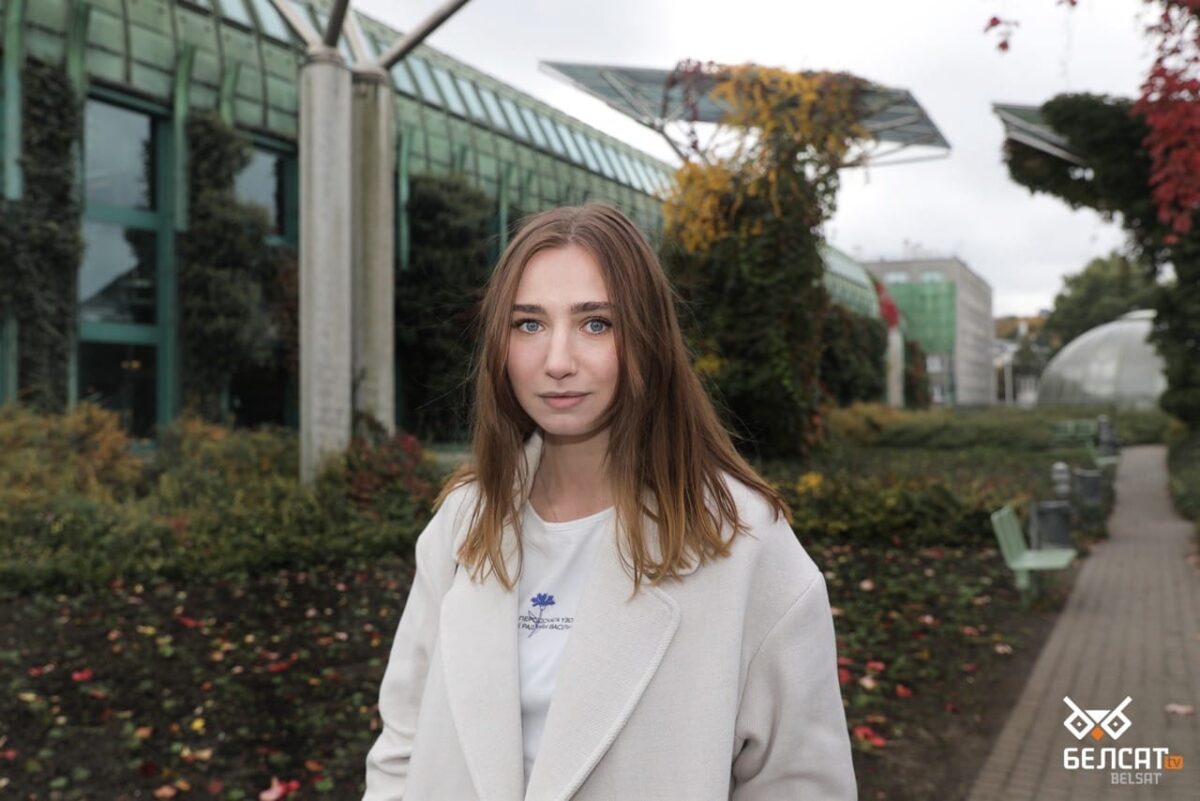
Photo: Alisa Hanchar / belsat.eu
I suggested to the editors that I go to Ukraine on a trip. I’m a reporter, so it’s hard for me to sit still. There were a few hurdles along the way, so it took me a year to get to Kramatorsk. I first visited in December, and then again in February.
On my second trip, I went to point zero as a camera person. I took a good sleep before the trip [laughs]. On our first business trip, we went to the HQ and saw a guy being brought in with a pretty bad injury. He was operated in front of me. But I don’t really want to talk about it.
I’m sticking with journalism, that’s no longer in question. My plan is to keep travelling to Ukraine, and not just there. I want to cover protests, something like that. I know I can do it, I’ve done it before, and I feel in my element when I am doing this job.
I talk to Ihar Ilyash, the husband of Katsiaryna Andreyeva. I only hear from her through Ihar or people who leave the prison and tell me how Katya is doing. I know that her health has really deteriorated recently, with lots of allergies and other problems.
I still feel the health effects. For instance, my eyesight has deteriorated. It is hard to imagine what happens to those who spend longer time behind bars… It’s scary to watch people break so much physically.
I think many people are feeling pretty down at the moment, and I’m no exception. It’s been about a year and a half, but bad news keep coming, it’s still with us every day. Every day we see arrests, sentencing, and so on. It’s a pretty rough time for us all. I reached out to various psychologists, but it didn’t help me, so now I’m trying to cope on my own.
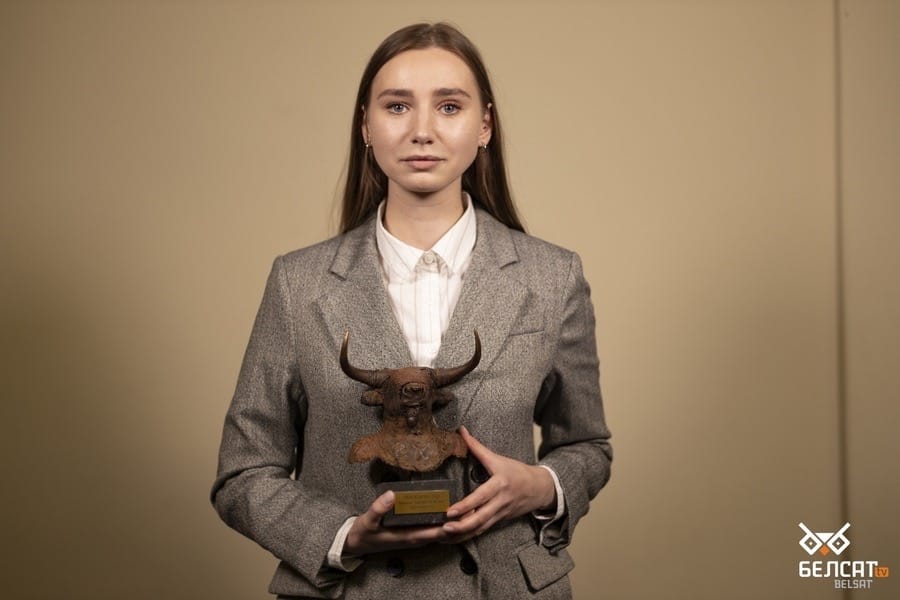
Photo: Yan Lisitski / belsat.eu
I’ve taken a moment to take stock and get my thoughts in order. And why did I say that? It’s not something people often discuss, but I believe many people are struggling with their mental health. I want to let others know that they’re not alone and that many of us are feeling the same way right now.
Terms and conditions
Partial or full reprint is permitted subject to following terms of use.
An active direct hyperlink to the original publication is required. The link must be placed in the header of the reprinted material, in the lead or the first paragraph.
Reprints, whether in full or in part, must not make changes to the text, titles, or copyrighted photographs.
When reprinting materials from this page, attribution must be given to the Press Club Belarus “Press under Pressure” project, collecting evidence of repression against independent media and journalists in Belarus.